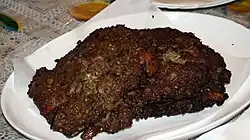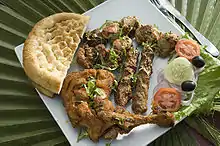 Lamb Chapli Kabab served at a Balti restaurant in Birmingham, UK | |
| Alternative names | Peshawari Chapli Kabab |
|---|---|
| Type | Kebab |
| Course | Appetiser, main course or side dish |
| Place of origin | Peshawar, Pakistan[1][2][3][4] |
| Associated cuisine | Pakistani,[5] Afghan,[5] Indian,[5] Bangladeshi[6] |
| Main ingredients | Minced beef, mutton, or chicken |
| Ingredients generally used | Various herbs and spices |
| Similar dishes | Burgers |
Chapli Kebab or Chapli Kabab (Pashto: چپلي کباب)[lower-greek 1][lower-greek 2] is a Pashtun-style minced kebab, usually made from ground beef, mutton or chicken with various spices in the shape of a patty. The Chapli Kabab originates from Peshawar in Pakistan.[1][7][3][8] The Peshawari Chapli Kabab is made with beef and is a popular street food throughout South Asia, including Pakistan, India, Afghanistan and Bangladesh.[5][6]
In India, Chapli Kabab can be found as street food in the cities of Bhopal, Lucknow, Delhi and Hyderabad; where Muslims have a denser population.[9]
Chapli Kababs are broadly consumed in Dhaka, Bangladesh. But it is most popular during the time of Eid-ul Azha and in ramadan as part of iftar.[6][10]
Chapli Kababs can be served and eaten hot with naan or as a bun kebab.[5]
Origins
Mughal culinary influences in the region popularised a number of kebab dishes, resulting in local recipes such as the Chapli Kebab.[5] The name chapli is said to be derived from the Pashto word chaprikh/chapdikh/chapleet, meaning "flat" – alluding to the kebab's light, round and flattened texture.[5] Another theory is that the name is derived from chappal, the local word for sandals – implying the average shape and size of a kebab, which resembles that of a front part of the chappal sole. Locals mostly agree with the first theory of Chapli being a short version of Chapleet (aka, Chapdikh). [11]
Chapli Kabab is served in thousands of kebab houses throughout Pakistan and Afghanistan[12] Such eateries have rapidly expanded in other cities as well. Today, the Chapli Kebab is featured on the menu of South Asian restaurants across the world.[12]
Ingredients and preparation
The Chapli Kebab is prepared with raw, marinated mince and the meat can be either beef or lamb/mutton. The main ingredients include wheat flour, various herbs and spices such as chili powder, coriander leaves, followed by smaller quantities of onions, tomatoes, eggs, ginger, coriander or cumin seeds, green chillies, corn starch, salt and pepper, baking powder and citric juice, like that of lime or lemon.[13][5]
The kebabs can be fried shallow or deep in vegetable cooking oil over medium heat. Some chefs fry the kebabs in lamb fat over wood-fired stoves to lend an organic flavour. This approach is avoided by some gastronomists, citing health-conscious reasons.[14]
Serving
Once cooked, Chapli Kebabs can be served and garnished with parsley, chopped onions and tomatoes, along with other accompaniments such as various chutney sauces, salad, yoghurt, pickles or nuts.[15][16][17] The Chapli Kebab is best served aromatic, moist and spicy.[18] It is considered a specialty of Pashtun cuisine and often served to guests.[19] The kebab is commonly consumed in meals with bread such as naan, rice dishes such as Kabuli pulao, or wrapped in fast food.[12] In winters, green tea such as kahwah may traditionally be served alongside it, while cold drinks are preferred in the summers.[12]
See also
Notes
References
- 1 2 Taylor Sen, Colleen; Bhattacharyya, Sourish; Saberi, Helen (2023-02-23). The Bloomsbury Handbook of Indian Cuisine. Bloomsbury Academic. p. 196. ISBN 978-1-350-12863-7.
Another fried kebab is chapli kebab that may have originated in Peshawar. The name comes either from Pushto chapleet, meaning 'flat', or from chappal, Hindi for sandal, alluding to its shape.
- ↑ "What Makes Chapli Kebab A Meat Lover's Dream Come True?". Slurrp. Retrieved 2023-04-26.
The Chapli Kabab is said to have its origins in Peshawar, Pakistan.
- 1 2 Bailey, Natasha (2023-01-18). "What Makes Pakistan's Chapli Kababs Different From Others?". Tasting Table. Retrieved 2023-04-26.
The Chapli kabab is one of Pakistan's most beloved dishes. This particular kabab was reportedly first created in Peshawar, in the northwestern corner of the country.
- ↑ "Eating Chapli Kababs in Northern Pakistan". The Localist. 2015-03-08. Retrieved 2023-04-26.
In Pakistan, chapli kabab originally comes from the northern areas, in particular Peshawer, capital of Khyber Pakhtunkhwa province.
- 1 2 3 4 5 6 7 8 Khan, Palwasha (2021-01-23). "Eating Chapli Kababs in Northern Pakistan". The Localist. Archived from the original on 2016-05-17. Retrieved 2021-04-08.
- 1 2 3 "Dhaka shops selling iftar delicacies". Bangla Tribune. Retrieved 2020-11-07.
- ↑ "What Makes Chapli Kebab A Meat Lover's Dream Come True?". Slurrp. Retrieved 2023-04-26.
The Chapli Kabab is said to have its origins in Peshawar, Pakistan.
- ↑ "Beef Chapli Kabab Eggless Recipe". homtainment. 2021-10-21. Retrieved 2023-07-02.
- ↑ "Chapli Kebab: The Flat Minced Meat Marvel Is An Explosion of Flavours You Must Not Miss". 27 October 2017.
- ↑ "'Chapli Kebab' - Alpana Habib". The Daily Star. Retrieved 2020-11-07.
- ↑ Mittmann, Karin; Ihsan, Zafar (1991). Culture Shock!: Pakistan. Graphic Arts Center Publishing Company. p. 104. ISBN 9781558680593.
- 1 2 3 4 Shinwari, Sher Alam (13 October 2013). "On the menu: Krazy about (Chapli) kebab". Dawn. Retrieved 25 July 2016.
- ↑ Burman, Divya. "Peshawari Chappali Kebab". NDTV Food. Retrieved 25 July 2016.
- ↑ Malik, Shiza (27 July 2015). "Khyber's most delicious export". Dawn. Retrieved 25 July 2016.
- ↑ Usmani, Sumayya. "Beef chapli kebab with pomegranate chutney". BBC Radio 4. Retrieved 25 July 2016.
- ↑ Webb, Lois Sinaiko; Roten, Lindsay Grace (2009). The Multicultural Cookbook for Students. ABC-CLIO. p. 102. ISBN 9780313375590.
- ↑ Agha, Bilal (25 March 2016). "Weekend grub: Could these chapli kebabs from Peshawar be the best in Pakistan?". Dawn. Retrieved 25 July 2016.
- ↑ Dupree, Louis (2014). Afghanistan. Princeton University Press. p. 231. ISBN 9781400858910.
- ↑ Khaliq, Fazal (16 February 2012). "Comfort food: Keeping warm with kebabs". The Express Tribune. Retrieved 25 July 2016.

